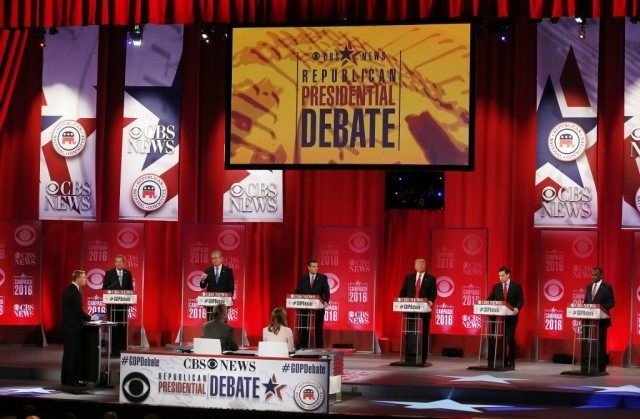The rapid-fire release of daily polls on the GOP Presidential primary understandably dominates the political conservation.
The immediate fortunes or setbacks for each candidate suck all the political oxygen out of the room. Taking a step back, however, reveals a primary campaign that is fundamentally reshaping the Republican party.
Looking at the RealClearPolitics average of national polls finds the three candidates generally regarded as political outsiders (Donald Trump, Ted Cruz and Ben Carson) together command just over 60 percent of the Republican vote.
The three insider candidates, including a sitting Governor and a former two-term Governor from a Republican dynasty, together earn just under 30 percent support from Republicans nationally.
This is not a late-breaking development in the primary campaign. Since August 2015, Trump, Cruz and Carson have together had a majority of Republican support nationwide. Not since April have Bush, Rubio and Kasich together commanded more than 30 percent of the vote from Republicans nationwide.
Most political punditry is currently obsessed over whether Marco Rubio, Jeb Bush or John Kasich will ultimately emerge as the “GOP establishment” candidate to challenge Donald Trump or Ted Cruz. The commentariat has spent weeks trying to predict which of these three will inherit the “establishment lane” on a road to the nomination.
This misses the larger point that, according to almost all polling anywhere, the establishment “lane” is nothing more than a foot-path today.
In the recent New Hampshire primary, Jeb Bush, Marco Rubio and John Kasich poured enormous resources and devoted considerable time to winning over voters in the Granite State. Kasich alone did more than 100 campaign events in one of the smallest states in the country where only around 280,000 people voted. Together, their campaigns and allied Super PACs spent more than $60 million advertising in the state.
On election day, the three combined received the support of less one in three voters in the primary. The pundits ruled that Jeb Bush’s fourth place showing was strong enough to earn him a ticket to the South Carolina primary. Bush received 11 percent of the Republican primary vote in New Hampshire.
Looking ahead to the South Carolina primary on Saturday, pundits are anticipating a strong third place showing from either Rubio or Bush. Finishing in third sounds impressive, until one realizes that a third place finish likely will garner just around 15 percent of the vote.
These are not the results one would have predicted one year ago.
Jeb Bush began the campaign with a $100 million Super PAC war chest that was intended to frighten other candidates out of the race. He built up a national campaign infrastructure quickly and spend considerable money on advertising.
Rubio, too, raised a considerable amount of money. His spending on TV advertising has been second only to Bush throughout the end of 2015 and 2016. He has been supported by several high-profile endorsements in addition to general praise from all areas of the political pundit class. Fox News generally declares him the winner of almost every candidate debate before the kleig lights have cooled down.
Kasich’s inability to gain considerable traction is perhaps less surprising. It is worth noting, though, that he is a popular Governor of a critically important state in the Presidential election. He spent several million dollars promoting his campaign in New Hampshire. Sure, he came in second in New Hampshire. It was, however, a second place finish that was won with just under 17 percent of the vote.
The most obvious story of the 2016 primary race so far is the unforeseen strength of the Donald Trump campaign. His landslide victory in New Hampshire will go down in history, regardless of what happens the rest of the campaign. His unorthodox approach has rewritten several rules that will shape future campaigns.
This campaign, though, isn’t just a Trump phenomenon. Nationally, Ted Cruz and Ben Carson together are essentially tied with Bush, Rubio and Kasich. A recent Fox poll of South Carolina found that, without Trump in the race, Cruz still beats Rubio by 6 points. With Cruz out of the race, Trump defeats Rubio by a massive 14 points.
If Trump weren’t a candidate, the three amigos of the establishment, Rubio, Bush and Kasich would together garner just 42 percent of the vote. If Cruz weren’t a candidate, the three would just earn around 40 percent of the vote.
That stat alone ought to keep Republicans in DC awake at night. Even if you take Trump or Cruz out of the race, the three standard-bearers of Washington Republicans can’t scrape together a majority of Republican voters.
The political revolt has already happened.

COMMENTS
Please let us know if you're having issues with commenting.